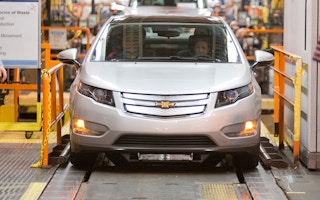Generals Motors (GM) generated $1bn of revenue from recycling and reuse initiatives last year, the automotive giant has revealed in its latest sustainability report.
The company confirmed that it recycles 90 per cent of its worldwide manufacturing waste and has 105 landfill-free facilities across the globe, a figure it aims to raise to 125 by the end of the decade.
As part of the waste reduction push plants in India, Thailand and Russia have replaced wooden pallets with reusable plastic, saving 566 tons of waste, while new auto paint robots and processes to reduce the use of paint thinner have saved up to 200 tons across two plants.
The company insisted that all by-products are now regarded as useful and marketable and as such are managed using an electronic tracking system in order to recover the highest value possible.
These innovations have helped GM reduce total waste by 25 kilograms per vehicle since 2010.
Progress has also been made in reducing energy use and carbon emissions, which have fallen seven per cent and five per cent respectively since 2010.
The company said it now uses more than 60MW of solar, landfill gas and biomass energy capacity at its facilities, putting it about halfway to its 125MW renewable energy target. Meanwhile, energy conservation initiatives have saved the company $66m in energy costs.
In a foreword to the report, GM chairman and chief executive Dan Akerson said energy diversity, resource conservation, and CO2 reduction were “business imperatives” for the organisation.
“Sustainability… can deliver revenue opportunities, cost savings and risk mitigation,” he added.
GM already sells six models with some form of electrification, including the Spark EV and the Chevrolet Volt, known as the Vauxhall Ampera in the UK, and intends to put 500,000 electric or hybrid electric cars onto US roads by 2017.
It also aims to double the number of fuel-efficient models with a rating of 40-mpg or better by 2017, as well as reduce its US fleet CO2 emissions 15 per cent by 2016 and Opel/Vauxhall fleet CO2 emissions 27 per cent by the end of the decade.










